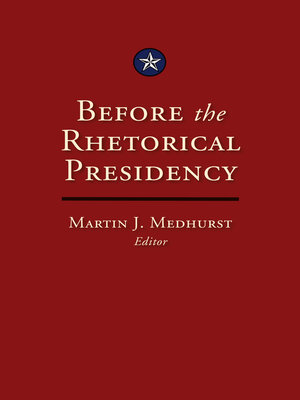Before the Rhetorical Presidency
ebook ∣ Presidential Rhetoric and Political Communication
By Martin J. Medhurst

Sign up to save your library
With an OverDrive account, you can save your favorite libraries for at-a-glance information about availability. Find out more about OverDrive accounts.
Find this title in Libby, the library reading app by OverDrive.



Search for a digital library with this title
Title found at these libraries:
| Library Name | Distance |
|---|---|
| Loading... |
Since its identification in 1981, the rhetorical presidency has drawn both defenders and critics. Chief among those critical of the practice is political theorist Jeffrey K. Tulis, whose 1987 book, The Rhetorical Presidency, helped popularize the construct and set forth a sustained analysis of the baleful effects that have allegedly accompanied the shift from a "constitutional" presidency to a "rhetorical" one.
Tulis locates this shift in the presidencies of Theodore Roosevelt and Woodrow Wilson, arguing that the rhetorical presidency is a twentieth-century phenomenon. Yet not all scholars agree with this assessment. Before the Rhetorical Presidency is an attempt to investigate how U.S. presidents in the nineteenth century communicated with their publics, both congressional and popular.
In part 1, Martin J. Medhurst, Mel Laracey, Jeffrey K. Tulis, and Stephen E. Lucas set forth differing perspectives on how the rhetorical presidency ought to be understood and evaluated. In part 2, eleven scholars of nineteenth-century presidential rhetoric investigate the presidencies of Martin Van Buren, John Tyler, James K. Polk, Franklin Pierce, James Buchanan, Andrew Johnson, Ulysses S. Grant, Rutherford B. Hayes, Benjamin Harrison, Grover Cleveland, and William McKinley.
As the first volume ever to focus on nineteenth-century presidents from a rhetorical perspective, Before the Rhetorical Presidency examines administrations, policies, and events that have never before been subjected to rhetorical analysis. The sometimes startling outcomes of these investigations reveal the need for continuing debate over the nature, practices, and effects of the rhetorical presidency.
In a brief afterword, Medhurst raises eight challenges to the original formulation of the rhetorical presidency and in so doing sets forth an agenda for future studies.
Tulis locates this shift in the presidencies of Theodore Roosevelt and Woodrow Wilson, arguing that the rhetorical presidency is a twentieth-century phenomenon. Yet not all scholars agree with this assessment. Before the Rhetorical Presidency is an attempt to investigate how U.S. presidents in the nineteenth century communicated with their publics, both congressional and popular.
In part 1, Martin J. Medhurst, Mel Laracey, Jeffrey K. Tulis, and Stephen E. Lucas set forth differing perspectives on how the rhetorical presidency ought to be understood and evaluated. In part 2, eleven scholars of nineteenth-century presidential rhetoric investigate the presidencies of Martin Van Buren, John Tyler, James K. Polk, Franklin Pierce, James Buchanan, Andrew Johnson, Ulysses S. Grant, Rutherford B. Hayes, Benjamin Harrison, Grover Cleveland, and William McKinley.
As the first volume ever to focus on nineteenth-century presidents from a rhetorical perspective, Before the Rhetorical Presidency examines administrations, policies, and events that have never before been subjected to rhetorical analysis. The sometimes startling outcomes of these investigations reveal the need for continuing debate over the nature, practices, and effects of the rhetorical presidency.
In a brief afterword, Medhurst raises eight challenges to the original formulation of the rhetorical presidency and in so doing sets forth an agenda for future studies.







